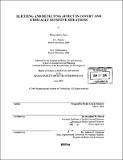Eliciting and detecting affect in covert and ethically sensitive situations
Author(s)
Davis, Philip Charles
DownloadFull printable version (12.53Mb)
Other Contributors
Massachusetts Institute of Technology. Dept. of Architecture. Program In Media Arts and Sciences
Advisor
Rosalind W. Picard.
Terms of use
Metadata
Show full item recordAbstract
There is growing interest in creating systems that can sense the affective state of a user for a variety of applications. As a result, a large number of studies have been conducted with the goals of eliciting specific affective states, measuring sensor data associated with those states, and building algorithms to predict the affective state of the user based on that sensor data. These studies have usually focused on recognizing relatively unambiguous emotions, such as anger, sadness, or happiness. These studies are also typically conducted with the subject's awareness that the sensors are recording data related to affect. This thesis describes two experiments that are designed to explore these two areas that these studies have not examined. The first experiment in this thesis focuses on eliciting and detecting the feeling of guilt, an emotion that is much more subtle than the emotions that most studies have examined. In the context of a specific experiment, we show that guilt level during a self-reflection period is correlated with overall electrodermal activity above a baseline value, but not well correlated with the frequency of skin conductivity responses or two features of an electrocardiogram. Our results also imply that collecting physiological data during a self-reflection period may contain useful information for lie detection above and beyond physiological data collected during the actual lie. The second experiment focuses on eliciting and detecting affect covertly with an ordinary computer mouse. The widespread use of the computer mouse makes this a particularly interesting area to explore. We were unable to find a relationship between mouse trajectory features and valence. (cont.) We did find that both velocity and acceleration off of a baseline level were correlated with arousal level.
Description
Thesis (S.M.)--Massachusetts Institute of Technology, School of Architecture and Planning, Program in Media Arts and Sciences, 2005. Includes bibliographical references (leaves 70-71).
Date issued
2005Department
Program in Media Arts and Sciences (Massachusetts Institute of Technology)Publisher
Massachusetts Institute of Technology
Keywords
Architecture. Program In Media Arts and Sciences